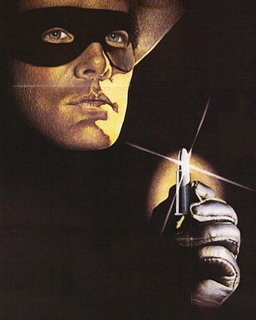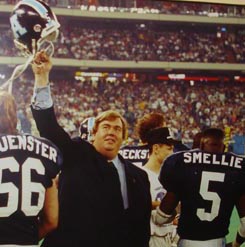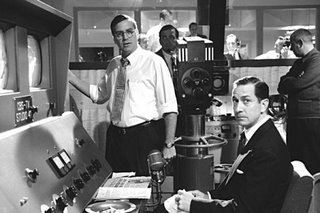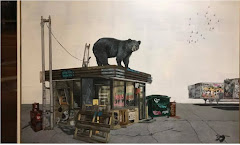
A couple of months ago, Will Dixon and I hooked up after a prolonged separation and he introduced me to the blogosphere. I liked what I saw and read, realizing I'd stumbled on a community searching for answers to the issues creative people confront.
I decided to test the waters by asking Will to post a submission I made to the CRTC (Canada's version of the FCC) in November of 2003. Not sharing my affinity for Don Henley's "The Best Light Comes From A Burning Bridge" philosophy, Will edited the document slightly and posted it September 9th under the heading, "No Bullsh*t Here". You can link to it below...
Original Post
...or read the version pasted at the end of this introduction.
The original document is more detailed, does not change names to protect the less than innocent (myself included) and has been posted in the CRTC's database for quite some time. If you've got a couple of hours, you can find it here...
CRTC Submission
Did the original document accomplish anything? Hard to say. There was an initial flurry from Commission aides wondering if I really wanted it made public, cautioning that it could have a "negative impact" on my career. I was honestly flattered. People in Ottawa cared about my well-being.
But I couldn't see any "positive impact" on my career or anybody else's unless the issues were addressed, so I said, "Let's do it!" I've noticed some changes since, small ones and maybe they're just the natural shifts that result from a thousand industry factors.
And if people were negative -- well, I've walked into a few buzz-saws in my life. It's never fun. You always come away with something missing or a new set of stitches. But unfortunately, it's often the only way things change.
It's human nature to follow the path of least resistance and just go along with things as they are. But every well traveled path eventually wears into a rut. Vested interests like ruts. It's easy to see where everybody's going. They can stake out the sides to sell you gas, burgers and a ticket to the reptile farm along the way.
The system is only interested in making sure nobody draws any attention to its flaws. So nothing changes until enough people say, "Uh, this isn't working anymore..." -- or somebody dynamites a new path.
I want to thank all of you who responded to the original post over at Uninflected Images Juxtaposed. You're the reason I'm here. And for those who haven't been exposed. Time to Cowboy Up...
RIDING THE BULL
I was born about the same time that television arrived in this country, growing up in a rural setting that was populated by cowboys and farmers and others whose living came from the land.
Entertainment was the local rodeo, when everybody put on their best boots, shiny buckles and Stetsons and went to watch the Bull riders.
It takes a lot of courage and skill to ride a bucking Brahma bull and staying aboard for the full eight seconds earns the rider not only a handsome purse but a great deal of respect. So, the rodeo ring is full of swaggering young cowpokes, wearing their best chaps and looking for all the world like bull riders. But all of them are aware of a simple rodeo adage – “You can fool everybody but the bull.” In other words, if you don’t know what you’re doing, the bull will figure it out in an instant and you not only won’t stay on his back, you may not survive the experience.
In the entertainment world, the bull we all try to ride, the creature we all try to subdue and conquer has another name. It’s called the audience. And anyone truly connected to this business understands that they are the ones who determine whether you succeed or end up gored and stomped on.
It’s my contention that the problems in the Canadian television industry arise from the fact that the audience is seldom, if ever, given consideration, as are many of those creative professionals who have learned how to ride it.
I began my professional career as an actor, dedicated to a then rare commodity known as the “Canadian play”. I had the good fortune to perform in more than a hundred new plays that told Canadian stories and enjoyed the additional pleasure of touring many of them to Europe and the United States. I moved on to writing films and television and then to producing. To date I can be held responsible for more than 200 hours of prime time drama – the vast majority for American television networks.
Yet, I have chosen to live and work in my own country, sharing the goal of seeing the kind of homegrown dramatic work that is produced all over the world produced here. But while I’ve had some success within the Canadian industry, you need to know some of the reasons why I think the ultimate goals we both seek are not being achieved.
There will be numerous people pointing the finger at the CRTC and its 1999 rulings. But I feel, as I’m sure you do, that there is far more to the problem.
Most of what I write and produce is considered popular entertainment. Cop shows, science fiction, horror and stuff for kids; romance films, movies with rampaging dinosaurs and TV shows with lots of cleavage. In short, I create what most people who turn on a television like to watch. I doubt that anybody would ever consider any of it “important” work.
But I also have a stack of letters from people whose lives have been informed, enhanced and even occasionally changed by what I’ve written and produced. So I know I’m doing something right and perhaps contributing to somebody’s definition of a culture at the same time.
But interestingly enough, Canadian networks barely return my calls. It’s a situation that is not unique to me, but unfortunately all too routine to many Canadian creative professionals with a resume of successful popular programming. We’ve never had anyone from a Canadian network tell us our material isn’t suitable, is too expensive or needs some re-tooling. They’re all simply “not what we’re looking for at this time”.
Requests for information on what they are seeking, illicit vague responses; if we receive any responses at all. We’re simply not on the list of people to whom they are talking.
In other words, they don’t want to be involved with someone whose track record proves they not only know and understand the bull, but also know how to ride it.
All that might encourage a normal person, or at least a well one who hasn’t been bucked on his head a few times, to look for another line of work. It might also indicate I’m hideously out of touch, over-the-hill or no longer relevant – except -- I still manage to sell scripts outside my own country.
Recently, I submitted a script to Telefilm for development. That submission garnered two immediate responses: one that the submitted material was “more than 25 pages long” and a second informing us that another document “was not double spaced”.
Another project was rejected within hours because I “didn’t have enough experience”. Calls to Telefilm for clarification went unreturned, even after we learned that projects had been accepted from producers who had little more than a couple of ten minute films or a single feature that had failed at the box office to their credit
I understand Telefilm is a hill I’ll have to die on at another time, but it got me wondering if either they or the CRTC were really seeking to further the development of popular entertainment or just continuing a process which has succeeded in virtually killing off a once thriving indigenous production industry.
Because we feel our culture is synonymous with being known as the “nice people” from the Americas; that means that those creating our programming are encouraged, either directly or indirectly to make sure our television doesn’t exhibit the same things we and the rest of the world associate with American television. As a result, we counter their big stars, action formats and fascination with sex with something that I’ll call “gratuitous niceness”.
In keeping with this same desire for acceptance, our programming is, for the most part, more concerned with “issues” than with character; more directed toward “reasoned exploration” than conflict, and more focused on “not offending anyone” than plot. All of these are laudable traits outside of the dramatic arena, but an assured recipe for creative disaster when they occur within it.
Look at any ad for a Canadian made television movie and you’ll notice that its selling points are seldom the stars or the story, but the “issues” we are told the film will earnestly address, and which, it is implied, we as Canadians are wrestling with in our daily lives, or have elsewise formed us as who we are.
I ask you to consider that the reason for this is not because the creators of those films passionately believe that such work will find a popular audience, but because they know it will find acceptance among those who want Canada to be associated with earnest values and more “acceptable” programming – and simply get made.
But it has been my experience that most Canadians do not turn on a television to be reminded of their Canadianism, or wrestle with societal issues, but only to be entertained. And in the same way a bull has been trained to buck, their understanding of what constitutes entertainment comes from years of watching the American version.
Therefore, if our programming does not replicate the more familiar technical and contextual traits of that programming, it will not find a popular audience, let alone hold it.
Some people might think such a statement means I want to see more American programming created in this country. I don’t. But I feel our dramatic films and series must be created by people with an understanding of what makes that programming style work and can then imbue it with an artistic vision that reflects this country.
A couple of years ago, I had the opportunity of meeting Peter Bart, the legendary Paramount Studio head of the 1970’s; a period considered by many to be the true Golden Age of American film. Mr. Bart green lighted such iconic films as “The Godfather” and “Chinatown” and is credited with discovering many of the great filmmakers of our time.
He visited our set, and during a discussion with the crew, I asked him what he thought of the Canadian industry. He kind of sighed and shook his head, “Canada,” he said, “I’ve never seen so much talent living in such denial.”
It’s a sentiment most creative professionals in this country completely understand. Those of us, who have ridden American bulls with success, aren’t even asked to climb on the back of the Canadian version. God forbid, we might speak to the Canadian audience in a language they understand or by way of stories that might interest them.
In many ways, we have become part of a process which puts the audience in third place, behind the needs of Government agencies and the networks; both of which appear motivated more and more by a “nine to five” culture.
In other words, decisions are made according to what is necessary to keep the system operating smoothly rather than accomplishing the most positive goals.
The simple answer to why we’re not succeeding in our own country is that the bulk of the programming is being overseen by people less than interested in doing it, let alone in doing it well or finding an audience for it.
A few years ago, economists Arthur De Vany and W. David Walls published a detailed study of 2000 movies and concluded: “Revenue forecasts have zero precision. A large budget and high profile stars may increase a film’s chance of success, but not enough to make the investment worthwhile. The only real determinate of long term success is word of mouth.”
Like I said, “You can fool everybody but the bull.”
The only way Canadian television networks will find an audience and the profits that come with them, is to back those creative professionals who have proven they can ride the bull and understand its next moves.
Please don’t interpret that as meaning you have to hire only me or someone with my experience. There is plenty of fresh talent in this country that suffers under the same restrictive operating procedures. It’s the process which needs to change.
In the American model, a script is written, either before or after a concept is sold to a network, and then a single episode is produced. If that single program finds acceptance with advertisers, who spend their entire lives figuring out what the Audience wants, then a few more (3 or 4) are ordered. If the market research is wrong and the audience does not appear, the project is usually canceled and something else replaces it.
That makes for a fairly cut throat business; with a large turnover in creative and executive staff. It’s a process which demands a high level of dedication and talent. But it inevitably produces programming audiences watch and to which enormous profits flow.
The Canadian model, more often than not, is to write a pilot script, and then write up to 13 more scripts which all undergo network scrutiny and receive some stamp of approval before a pilot is ever considered. More often than not, rather than a pilot, all 13 episodes are filmed, edited and in the can long before the first even debuts to its first audience.
Because script writing alone can take a year or more, these projects are always in danger of being out of date or overtaken by competitors before they ever see the light of day and they make the process more expensive than it has to be.
More importantly, it ignores the basic realities of finding an audience. What if the audience doesn’t like some part of the concept or the arena in which the series takes place? What if they don’t like a character? It’s too late to change those elements, because your series is finished, you just have to keep disappointing them, and they go in search of something else.
Television series are very organic creatures. They’re created by a collaborative team of individual artists who bring their own unique talents to the process. I’ve never worked on a series where scripts were delivered more than a few weeks in advance of their production dates. And while that means longer hours and more stress for all concerned, it also means that the stories can take advantage of growing strengths within a production and eliminate the weaknesses or dislikes we’re picking up from not only our network bosses, but the audience.
Because the audience is the purpose and the most important element of this process.
I’ve worked on series where bit players have evolved into stars because the opportunity existed to discover their talents and give their characters room to grow. I’ve seen stars reveal their true talents by radically altering characters an audience had initially rejected, and I’ve seen series revise their entire creative direction when the audience indicated what they really wanted to see.
Sometimes those changes make you proud of the work you are doing, because you can tell stories that an audience connects with because they are “into” the show. Sometimes they add to the time you spend in a bar on Friday nights. But good or disappointing, you know that the audience will be back the next week for more and whatever artistic agenda you have gets another chance.
The Canadian system of virtually ignoring the audience’s participation leaves you open to their dissatisfaction or disinterest, while serving that “nine to five” mentality. “We’re giving them the Canadian content we need to keep our license.” “It’s a cost of doing business.” “It doesn’t matter if anybody is watching because it isn’t our money and …oh, it’s five o’clock, time to go home.”
The same money that funds 13 episodes of one show could more productively be spent on shooting four episodes of three shows, or three episodes of four, even pilots for a dozen. That money should all come from the networks and producers, who, knowing that they didn’t have grants and government funding to make their jobs “safe”, would actually have to acquire the very real producer skill of figuring out what the audience wants.
If a show appears to be getting ratings, that’s when the funding could kick in. And it should be done at a level that rewards the risks already taken, by making a commitment to a full season of shows, not the anemic orders of 13 that typify a Canadian “season”.
As Les Moonves, president of CBS, has been oft quoted, “You must be available to your audience at least 22 times a season. It’s like dating a pretty girl. If you don’t come around to see her, somebody else will.”
Canadian broadcasters are well aware that they compete directly with the most successful television networks in the world. Yet, with a few exceptions, they insist on beginning seasons of shows 3 or 4 months after viewers, already into their winter viewing patterns, have picked favorites or which nights they are even watching television. By debuting shows in December or January, Canadian series are virtually assured they will never be found. It’s a policy which is “safe” but, once again, gives an edge to failure.
As risky as it may seem to debut Canadian series at the same time as American networks, we have to realize that this is when the audience has been programmed to make its selections. And if they are offered programming which, as I said earlier, replicates what they are used to seeing from American sources, at least contextually, they will have no problem with the Canadian content we all want to see included.
I’m constantly overwhelmed that our execs all know the right buzz phrases, but haven’t figured out what’s really behind them. And while they try to find that “just right” program that will set them apart (as long as it has a US partner to pay for it) they fail to see that the business they’re in is only a couple of inches away from totally disappearing.
While Bravo/Showcase/History/Whoever are trumpeting the debut of the first season of “Deadwood”, the high school kid next door has just burned season 3 for all of his buds on first day back to school. None of them will ever watch the Canadian broadcast. Yesterday he showed me the episode of “Eureka” that aired this week on his Creative Zen player. One of his friends emailed it to him along with the new Okay, Go album.
None of these guys buys anything anymore except hardware – and blank media.
The audience has adopted that old Vegas motto “Everything. All the time.” They want “Entourage” now, not when somebody with a broadcast license decides to feed it to them. Even Tivos are yesterday’s tech. When CBS is making more money on itunes downloads of CSI than they’re getting in rentals from CTV, CTV may suddenly realize they didn’t make (or own) any independent programming they can sell to offset the audience that isn’t watching their American product anymore.
Humor me, as, in closing, I return to my roots and the rodeo. If you don’t have the courage or skill to step inside that corral, you have no business even being there. And the same is true of producers and networks. If they don’t have the trust, in their own skills and talents, to take the risk such a system will ask of them, and the needs of the audience demand, they also shouldn’t be where they are.
A bull rider must pay an entry fee before he draws a bull and rides for the prize money. It’s not unusual to see a cowboy “sell his saddle” to pay that entry fee. If he loses, he’s broke and without any way of earning a living.
That same risk is taken daily by every creative professional in this country. At the moment, it is not a risk shared by the producers and networks who dominate our industry. Safely funded, safely unscrutinized, they continue a process that generally does not find projects that connect with our nation’s audiences.
They continue to fool everybody but the bull and its time they were made to ride him.















